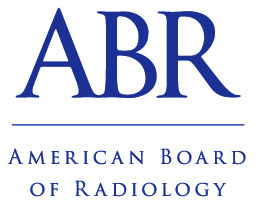March 10
IR/DR Certifying Exam Process Changes Coming in 2029
Beginning in 2029 and first applying to Interventional Radiology residents completing training in June 2029 (entered their IR1 year in July 2024), the Interventional Radiology/Diagnostic Radiology (IR/DR) Certifying Exam process will require a candidate to pass the Diagnostic Radiology (DR) Oral Exam and the IR Oral Exam. The exact timing of the DR Oral Exam and the IR Oral Exam are still being evaluated. We will provide an update later in 2025.
The computer-based component of the current IR/DR Certifying Exam will not be offered after calendar year 2028.
The IR/DR Qualifying (Core) Exam’s content, format, and timing will remain unchanged.
 In May 2024, in light of the ABR’s decision to return to an oral exam format for the DR Certifying Exam in 2028, we began seeking input and insight from IR stakeholders to determine whether an imbalance would be created once the new DR Oral Exam was implemented. Specifically, if the DR assessment, as part of the IR/DR certification process, would be adequately equivalent to that same DR assessment in the DR-only certification process.
In May 2024, in light of the ABR’s decision to return to an oral exam format for the DR Certifying Exam in 2028, we began seeking input and insight from IR stakeholders to determine whether an imbalance would be created once the new DR Oral Exam was implemented. Specifically, if the DR assessment, as part of the IR/DR certification process, would be adequately equivalent to that same DR assessment in the DR-only certification process.
This comprehensive stakeholder input process was facilitated by a third party: Jennings Healthcare Marketing. The process focused on gathering feedback and perspectives through multiple channels as the precursor to considering possible process modifications. Stakeholder input included three primary sources:
Individual Interviews. We started the input process by identifying several dozen IR leaders familiar with IR resident education, certification, and practice. Jennings facilitated these interviews.
Stakeholder Focus Groups. Given the large number of affiliated organizations in radiology, we focused on several key groups representing residents, program directors, department chairs, private practice, and community radiology perspectives. Jennings helped facilitate multiple structured feedback sessions with these organizations’ executive leadership. In addition, the organizations were encouraged to seek input from their constituency.
Stakeholder Survey. We provided an opportunity for individual input and feedback through the publicly available IR/DR Initial Certification Feedback Survey, which was distributed through the ABR website, The Beam e-newsletter, and social media. The survey was available August 7 through December 13, 2024.
We appreciate the engagement and thoughtful discussions we had with so many people during this time of focused stakeholder input, including the response to the individual stakeholder input survey.
Stakeholder Input Summary
Overview:
There was broad consensus that change in the IR/DR certification process was necessary because of the imbalance between the two certification pathways.
Jennings asked several questions of stakeholders and received consistent feedback:
Does the new DR Oral Exam create an imbalance?
- The current IR/DR Certifying Exam process is fine now but needs to change once the DR Certifying Exam goes back to the oral format.
- IR/DR candidates need to take the same exam as DR candidates, no matter how complicated it is, to evaluate their diagnostic radiology skills.
Does the imbalance create the need for a change to the IR/DR Certifying Exam process?
- Since both DR and IR/DR certificate holders interpret diagnostic imaging studies, they need to be assessed with the same DR exam.
- Employers, the public, and, potentially, payors may perceive an imbalance between the diagnostic imaging skills of DR certificate holders compared with IR/DR certificate holders if they are taking substantially different exams.
- The diplomate certified in IR/DR has the same DR certification as a diplomate certified only in DR, and therefore should take the same exam as the DR diplomate to assess their diagnostic radiology skills and knowledge.
In general, stakeholders believe there will be an imbalance between the IR/DR certification process and the DR-only certification process created by the new DR Oral Certifying Exam. In addition, they believe that this imbalance has the potential to negatively impact perceptions and, therefore, the ABR should develop a solution to create greater equivalency in the two processes.
New IR/DR Certifying Exam Process Frequently Asked Questions (FAQs)
Where can I find out more about the new DR Oral Exam?
Details are available here.
Will the computer-based component still be part of the IR/DR Certifying Exam?
The last computer-based component of the IR/DR Certifying Exam will be offered in 2028. After 2028 the computer-based component will be replaced by the DR Oral Exam.
I will complete my IR residency in June 2029. What exams do I have to take to become IR/DR certified?
Beginning with the IR residency class of 2029, the certifying exam process for IR/DR will require a candidate to pass the DR Oral Exam and the IR Oral Exam. The exact timing of each exam is still being evaluated. We will provide an update later in 2025.
What happens if I pass the DR Oral Exam but fail the IR Oral Exam?
You would need to take the IR Oral Exam again. Candidates must pass both the DR Oral Exam and the IR Oral Exam for IR/DR certification to be conferred.
When are the expected times for the exams for the first year and subsequent years?
We anticipate an exam administration in the winter/spring and another in the fall of each year. We’ll post exam dates on the ABR website approximately 18 months before the first exam.
Will this have any impact on the IR/DR Qualifying (Core) Exam?
No. There will be no changes to the Qualifying (Core) Exam content or timing.
How many times can I take the DR Oral Exam and the IR Oral Exam?
Candidates may take the exam through the end of their board eligibility, which extends six full calendar years after the completion of residency training. We anticipate having two administrations of the DR Oral Exam and the IR Oral Exam each year.
What happens if I don’t pass before my board eligibility expires?
This policy is unchanged. Candidates failing to successfully complete the initial certification process within the board eligibility period are no longer considered by the ABR to be board eligible and are no longer permitted to designate themselves as such for communications or credentialing purposes. Candidates wishing to regain board eligible status must complete an additional year of training.
What if I have failed or not taken the computer-based component of the IR/DR Certifying Exam by 2028? What exam will I take?
Beginning in 2029, those who fail the IR/DR Certifying Exam computer-based component by the end of 2028 would need to take the DR Oral Exam, regardless of when they completed IR residency training.
What if I can’t take the new exam during the time it is offered?
We anticipate having two administrations each year for both the DR Oral Exam and the IR Oral Exam to allow flexibility.
What is the cost for the exam?
No change in cost is anticipated as a result of implementing the new IR/DR Certifying Exam process. The exam fees are available here.
The ABR is welcoming seven members to its Board of Trustees (BOT) this year.
Sherwin Chan, MD, PhD, started March 1 as the diagnostic radiology pediatrics representative. John Fritz Angle, MD (interventional radiology/diagnostic radiology), Isabel Cortopassi, MD (diagnostic radiology cardiothoracic imaging), Jeff M. Michalski, MD, MBA (radiation oncology), Michelle Miller-Thomas, MD (diagnostic radiology neuroradiology), Sameer Tipnis, PhD (diagnostic medical physics), and Darryl Zuckerman, MD (interventional radiology/diagnostic radiology) will join the BOT at the conclusion of the fall Board meeting.
 Dr. Angle is a professor of radiology and medical imaging and director of the division of vascular and interventional radiology at the University of Virginia School of Medicine. He earned his medical degree from the University of Nebraska College of Medicine in Omaha. Dr. Angle completed a diagnostic radiology residency at Truman Medical Center in Kansas City and a fellowship in interventional radiology at the University of Virginia.
Dr. Angle is a professor of radiology and medical imaging and director of the division of vascular and interventional radiology at the University of Virginia School of Medicine. He earned his medical degree from the University of Nebraska College of Medicine in Omaha. Dr. Angle completed a diagnostic radiology residency at Truman Medical Center in Kansas City and a fellowship in interventional radiology at the University of Virginia.
Dr. Chan is vice chair for research in the department of radiology at Children’s Mercy Hospital in Kansas City and professor of radiology and director of research in the department of radiology at the University of Missouri-Kansas City. He earned his MD/PhD in biomedical engineering at the Washington University School of Medicine in St. Louis. Dr. Chan completed a radiology residency at the University of Washington and a pediatric fellowship at Children’s Hospital of Philadelphia.
Dr. Cortopassi is a professor and vice chair of education in the department of radiology at the Mayo Clinic College of Medicine and Science in Jacksonville, Florida. She earned her medical degree from Universidade Federal de Pernambuco in Recife, Brazil. Dr. Cortopassi completed an internal medicine residency at Hospital of Restauracão in Recife, and a diagnostic radiology residency at InCor-Hospital das Clinicas, University of Sao Paulo in Brazil. She finished her US-based radiology training at Brigham and Women’s Hospital in Boston.
 Dr. Michalski is a professor and vice chair and director of clinical programs at the Mallinckrodt Institute of Radiology at Washington University School of Medicine in St. Louis. He earned his MD at the Medical College of Wisconsin, completed his residency at the Mallinckrodt Institute of Radiology and earned an MBA at Washington University’s John Olin School of Business.
Dr. Michalski is a professor and vice chair and director of clinical programs at the Mallinckrodt Institute of Radiology at Washington University School of Medicine in St. Louis. He earned his MD at the Medical College of Wisconsin, completed his residency at the Mallinckrodt Institute of Radiology and earned an MBA at Washington University’s John Olin School of Business.
 Dr. Miller-Thomas is a professor of radiology, director of medical student education in radiology, and vice chair of faculty development at the Mallinckrodt Institute of Radiology at Washington University School of Medicine in St. Louis. She earned her MD from Saint Louis University School of Medicine. Dr. Miller-Thomas completed a diagnostic radiology residency at the University of Texas Health Center in Houston and a fellowship in neuroradiology at Washington University School of Medicine in St. Louis.
Dr. Miller-Thomas is a professor of radiology, director of medical student education in radiology, and vice chair of faculty development at the Mallinckrodt Institute of Radiology at Washington University School of Medicine in St. Louis. She earned her MD from Saint Louis University School of Medicine. Dr. Miller-Thomas completed a diagnostic radiology residency at the University of Texas Health Center in Houston and a fellowship in neuroradiology at Washington University School of Medicine in St. Louis.
 Dr. Tipnis is a professor of radiology and chief medical physicist at the Medical University of South Carolina. He earned a master’s in physics at the University of Bombay (now the University of Mumbai) in India and a PhD from the University of Massachusetts Lowell.
Dr. Tipnis is a professor of radiology and chief medical physicist at the Medical University of South Carolina. He earned a master’s in physics at the University of Bombay (now the University of Mumbai) in India and a PhD from the University of Massachusetts Lowell.
 Dr. Zuckerman is an associate professor of radiology and biomedical imaging at the Yale University School of Medicine. He earned his MD from SUNY Upstate Medical University in Syracuse. Dr. Zuckerman completed his diagnostic radiology residency at Long Island Jewish Medical Center and a fellowship in vascular radiology at Massachusetts General Hospital.
Dr. Zuckerman is an associate professor of radiology and biomedical imaging at the Yale University School of Medicine. He earned his MD from SUNY Upstate Medical University in Syracuse. Dr. Zuckerman completed his diagnostic radiology residency at Long Island Jewish Medical Center and a fellowship in vascular radiology at Massachusetts General Hospital.
The BOT advances the quality, relevance, and effectiveness of the ABR’s exams for Initial and Continuing Certification across all disciplines of radiology. The BOT makes recommendations to the Board of Governors regarding assessment structure including, but not limited to, exam format, content, assembly, delivery, scoring, and feedback. Members have specialty and subspecialty expertise, reflecting major areas of clinical practice.
Beginning in 2029 and first applying to Interventional Radiology residents completing training in June 2029 (entered their IR1 year in July 2024), the Interventional Radiology/Diagnostic Radiology (IR/DR) Certifying Exam process will require a candidate to pass the Diagnostic Radiology (DR) Oral Exam and the IR Oral Exam. The exact timing of the DR Oral Exam and the IR Oral Exam are still being evaluated. We will provide an update later in 2025.
The computer-based component of the current IR/DR Certifying Exam will not be offered after calendar year 2028.
The IR/DR Qualifying (Core) Exam’s content, format, and timing will remain unchanged.
 In May 2024, in light of the ABR’s decision to return to an oral exam format for the DR Certifying Exam in 2028, we began seeking input and insight from IR stakeholders to determine whether an imbalance would be created once the new DR Oral Exam was implemented. Specifically, if the DR assessment, as part of the IR/DR certification process, would be adequately equivalent to that same DR assessment in the DR-only certification process.
In May 2024, in light of the ABR’s decision to return to an oral exam format for the DR Certifying Exam in 2028, we began seeking input and insight from IR stakeholders to determine whether an imbalance would be created once the new DR Oral Exam was implemented. Specifically, if the DR assessment, as part of the IR/DR certification process, would be adequately equivalent to that same DR assessment in the DR-only certification process.
This comprehensive stakeholder input process was facilitated by a third party: Jennings Healthcare Marketing. The process focused on gathering feedback and perspectives through multiple channels as the precursor to considering possible process modifications. Stakeholder input included three primary sources:
Individual Interviews. We started the input process by identifying several dozen IR leaders familiar with IR resident education, certification, and practice. Jennings facilitated these interviews.
Stakeholder Focus Groups. Given the large number of affiliated organizations in radiology, we focused on several key groups representing residents, program directors, department chairs, private practice, and community radiology perspectives. Jennings helped facilitate multiple structured feedback sessions with these organizations’ executive leadership. In addition, the organizations were encouraged to seek input from their constituency.
Stakeholder Survey. We provided an opportunity for individual input and feedback through the publicly available IR/DR Initial Certification Feedback Survey, which was distributed through the ABR website, The Beam e-newsletter, and social media. The survey was available August 7 through December 13, 2024.
We appreciate the engagement and thoughtful discussions we had with so many people during this time of focused stakeholder input, including the response to the individual stakeholder input survey.
Stakeholder Input Summary
Overview:
There was broad consensus that change in the IR/DR certification process was necessary because of the imbalance between the two certification pathways.
Jennings asked several questions of stakeholders and received consistent feedback:
Does the new DR Oral Exam create an imbalance?
- The current IR/DR Certifying Exam process is fine now but needs to change once the DR Certifying Exam goes back to the oral format.
- IR/DR candidates need to take the same exam as DR candidates, no matter how complicated it is, to evaluate their diagnostic radiology skills.
Does the imbalance create the need for a change to the IR/DR Certifying Exam process?
- Since both DR and IR/DR certificate holders interpret diagnostic imaging studies, they need to be assessed with the same DR exam.
- Employers, the public, and, potentially, payors may perceive an imbalance between the diagnostic imaging skills of DR certificate holders compared with IR/DR certificate holders if they are taking substantially different exams.
- The diplomate certified in IR/DR has the same DR certification as a diplomate certified only in DR, and therefore should take the same exam as the DR diplomate to assess their diagnostic radiology skills and knowledge.
In general, stakeholders believe there will be an imbalance between the IR/DR certification process and the DR-only certification process created by the new DR Oral Certifying Exam. In addition, they believe that this imbalance has the potential to negatively impact perceptions and, therefore, the ABR should develop a solution to create greater equivalency in the two processes.
New IR/DR Certifying Exam Process Frequently Asked Questions (FAQs)
Where can I find out more about the new DR Oral Exam?
Details are available here.
Will the computer-based component still be part of the IR/DR Certifying Exam?
The last computer-based component of the IR/DR Certifying Exam will be offered in 2028. After 2028 the computer-based component will be replaced by the DR Oral Exam.
I will complete my IR residency in June 2029. What exams do I have to take to become IR/DR certified?
Beginning with the IR residency class of 2029, the certifying exam process for IR/DR will require a candidate to pass the DR Oral Exam and the IR Oral Exam. The exact timing of each exam is still being evaluated. We will provide an update later in 2025.
What happens if I pass the DR Oral Exam but fail the IR Oral Exam?
You would need to take the IR Oral Exam again. Candidates must pass both the DR Oral Exam and the IR Oral Exam for IR/DR certification to be conferred.
When are the expected times for the exams for the first year and subsequent years?
We anticipate an exam administration in the winter/spring and another in the fall of each year. We’ll post exam dates on the ABR website approximately 18 months before the first exam.
Will this have any impact on the IR/DR Qualifying (Core) Exam?
No. There will be no changes to the Qualifying (Core) Exam content or timing.
How many times can I take the DR Oral Exam and the IR Oral Exam?
Candidates may take the exam through the end of their board eligibility, which extends six full calendar years after the completion of residency training. We anticipate having two administrations of the DR Oral Exam and the IR Oral Exam each year.
What happens if I don’t pass before my board eligibility expires?
This policy is unchanged. Candidates failing to successfully complete the initial certification process within the board eligibility period are no longer considered by the ABR to be board eligible and are no longer permitted to designate themselves as such for communications or credentialing purposes. Candidates wishing to regain board eligible status must complete an additional year of training.
What if I have failed or not taken the computer-based component of the IR/DR Certifying Exam by 2028? What exam will I take?
Beginning in 2029, those who fail the IR/DR Certifying Exam computer-based component by the end of 2028 would need to take the DR Oral Exam, regardless of when they completed IR residency training.
What if I can’t take the new exam during the time it is offered?
We anticipate having two administrations each year for both the DR Oral Exam and the IR Oral Exam to allow flexibility.
What is the cost for the exam?
No change in cost is anticipated as a result of implementing the new IR/DR Certifying Exam process. The exam fees are available here.




